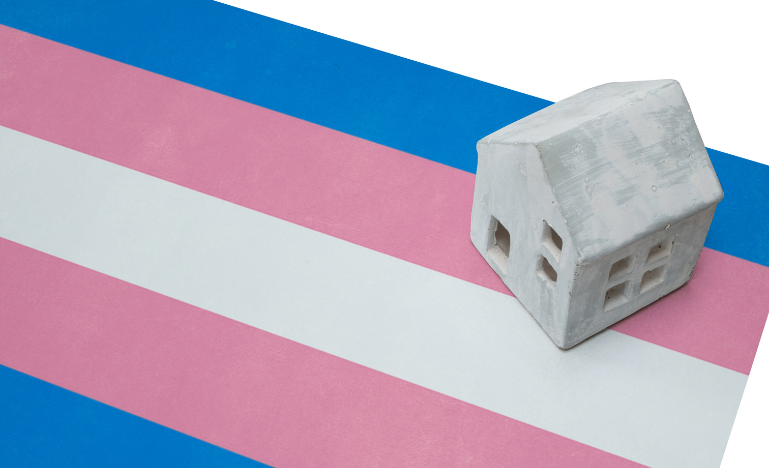A pathway to safety for trans Americans
The CBA is calling for changes to Canada’s immigration system as it’s ill-equipped to respond to the emerging crisis south of the border, and the surge of inquiries from people fearing violence and persecution

GPat Patterson knew it was time to leave the United States when surveillance vans showed up outside their Ohio home.
The Kent State University professor teaches women’s gender and sexuality studies and is one of the few openly trans faculty.
“I have a target on my back,” Patterson said from Toronto, where they and their husband, who is also trans, are now living. The couple is seeking asylum in Canada.
Patterson was moved to tears while reading a letter sent last month to Immigration Minister Lena Diab by the Canadian Bar Association’s immigration law section, its Sexual and Gender Diversity Alliance, and equity subcommittee.
It raises several alarms. They include “a surge in inquiries from trans individuals in the U.S.” – a term used for transgender, non-binary and gender diverse people – “citing fears of violence, denial of healthcare, and other forms of persecution.”
“Refugee claims have already been filed and are before the Immigration and Refugee Board. However, Canada’s current immigration framework is ill-equipped to respond to this emerging crisis,” the letter states.
U.S. asylum system cannot be presumed safe
It proposes that Canada unilaterally withdraw from the Safe Third Country Agreement (STCA) with the U.S. or negotiate an exemption for trans people.
“Continued enforcement of the STCA risks violating Canada’s international human rights obligations and undermining its commitment to refugee protection.”
The letter notes this country has historically denied refugee claims from Americans under presumed “state protection and internal flight alternatives.”
“This presumption is no longer valid given the systemic targeting of trans people across the U.S., from the federal government and through the introduction of anti-trans legislation in nearly every state.”
The letter recommends one-year, renewable temporary resident permits under section 24 of the Immigration and Refugee Protection Act for those barred from the refugee system. Permits would be issued at ports of entry, allowing access to permanent residence through fast-tracked humanitarian and compassionate applications.
The CBA calls on IRCC to set up a special immigration measures program for trans people, extending protections to third-country nationals who are living or have previously lived in the U.S., regardless of their U.S. immigration status.
“The U.S. asylum system cannot be presumed safe for trans claimants when the U.S. government itself denies their existence.”
Further recommendations include training for IRCC staff “to develop immigration responses that are trauma-informed, inclusive and rights-based for the trans community.”
In an emailed response, IRCC says it can’t speculate on future policy and does not comment on “internal U.S. government measures.”
The department and the Immigration and Refugee Board have guidelines to “consider the specific vulnerabilities of (2SLGBTQIA+) people when assessing risks,” it says.
“They regularly review country information, train staff, and update guidance to ensure decisions reflect current realities.”
IRCC says the Safe Third Country Agreement “remains an important tool” to work with the U.S. on managing asylum claims along the border.
The federal government has faced intense backlash from Amnesty International and other human rights advocates since it introduced Bill C-2 in June and Bill C-12 in October.
While proponents cite a need for tighter border security, critics say the bills would undermine refugee and immigrant protections, along with due process.
Bill C-12 would also require that asylum claims be made within one year of first entry to Canada for those who arrived after June 2020. Critics argue this overlooks the frequency with which people cross the border and how their situations may change.
'Pervasive transphobia'
Back in the U.S., Patterson launched an ongoing federal lawsuit in 2022 alleging Kent State discriminated against them because of their gender identity when it denied them a promotion.
Patterson says they also stood up for students who felt “dehumanized” by “pervasive transphobia.”
Things escalated last April when Patterson worked on an art project in a park near their Ohio home with some neighbourhood kids. It included a large rainbow sign that said “Democracy.”
“That was the first time I was approached by Christian nationalists outside of my house who started interviewing me like they were law enforcement, and then tried to witness to me.”
Someone removed the rainbow in the park, and Patterson received a mysterious text asking: “Have you made any art lately?”
Surveillance vehicles arrived next.
“I cannot be seeing people sitting in cargo vans outside my house,” Patterson thought at first.
“This can’t be real.”

The month before, in March, Immigration and Customs Enforcement (ICE) was rounding up students and faculty of colour at American universities, as President Donald Trump’s administration went after noncitizens who spoke out for Palestine.
Around the same time, more than 200 Venezuelans were flown to El Salvador with little or no due process, to be locked up for allegedly lacking legal status or having gang ties.
For Patterson, there was no doubt it was time to go when Trump commented in April that “homegrowns” were next.
“My time as a professor, even though I’m quite good at what I do, it seems as if that will probably be ending for me, at the very least at Kent State,” they said.
“My hope is that Canada will allow us to stay. But at this moment, I think the overwhelming feeling that I’m having is just so much grief.
“I feel like a ghost in my own life.”
Patterson says trans people have been increasingly scapegoated since the “MeToo” movement soared in the U.S. in 2017.
In Trump’s second term, more than 1,000 anti-trans bills have been introduced across 49 states aimed at banning federal funding for gender-affirming health care, misgendering on passports and official documents, and exclusion of preferred pronouns.
Patterson’s life has unravelled “not because I am a dangerous human being, but because a man with a number of felonies is trying to escape accountability for his crimes and projecting that onto marginalized people in my country.”
'This is not people being alarmist'
Calgary immigration lawyer Yameena Ansari represents Patterson and consults with about 11 other trans Americans every week.
“This is almost my entire workload right now,” she says.
“For me, as a cis woman, I didn’t really understand what was happening and how quickly it was happening.
“This is not people being alarmist.”
The federal reach of Trump’s anti-trans executive orders means that, blue state or red, trans people are affected.
Many of Ansari’s clients are professionals and entrepreneurs willing to take “a massive pay cut” to feel safer in Canada.
“They’re selling their houses and bringing their hundreds of thousands here,” she says.
“That land of the free and the brave, within a very short amount of time, has become the land of The Handmaid’s Tale, pretty much.”
In Toronto, Latoya Nugent, head of engagement for Rainbow Railroad, says they received 1,000 requests for help from the U.S. in the first 24 hours after Trump’s election win.
“That had never happened in our organization’s history.”
Another 6,000 requests — approximately one-third of all global files — have been received since January.
Rainbow Railroad is a registered charity in Canada that works to safely relocate persecuted 2SLGBTQIA+ people around the world. It also has charitable status in the U.S.
As the situation in America deteriorates, “it's a really terrifying time,” Nugent says.
“There are people who are afraid to leave their homes because they’re so fearful of having any kind of interaction with ICE.”
Canada is still seen internationally as a welcoming country, despite a recent uptick in anti-immigration sentiment, fueled by concerns and anger around housing and economic issues. Nugent says blaming traumatized newcomers for those issues is deeply unfair.
“People do not choose to become refugees,” she says.
“Compassion must play a critical role in how a country responds to what is happening to the global human community.”


